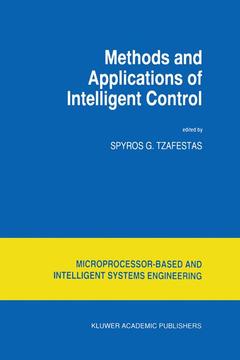Methods and Applications of Intelligent Control, 1997 Intelligent Systems, Control and Automation: Science and Engineering Series, Vol. 16
Langue : Anglais
Coordonnateur : Tzafestas S.G.

This book is concerned with Intelligent Control methods and applications. The field of intelligent control has been expanded very much during the recent years and a solid body of theoretical and practical results are now available. These results have been obtained through the synergetic fusion of concepts and techniques from a variety of fields such as automatic control, systems science, computer science, neurophysiology and operational research. Intelligent control systems have to perform anthropomorphic tasks fully autonomously or interactively with the human under known or unknown and uncertain environmental conditions. Therefore the basic components of any intelligent control system include cognition, perception, learning, sensing, planning, numeric and symbolic processing, fault detection/repair, reaction, and control action. These components must be linked in a systematic, synergetic and efficient way. Predecessors of intelligent control are adaptive control, self-organizing control, and learning control which are well documented in the literature. Typical application examples of intelligent controls are intelligent robotic systems, intelligent manufacturing systems, intelligent medical systems, and intelligent space teleoperators. Intelligent controllers must employ both quantitative and qualitative information and must be able to cope with severe temporal and spatial variations, in addition to the fundamental task of achieving the desired transient and steady-state performance. Of course the level of intelligence required in each particular application is a matter of discussion between the designers and users. The current literature on intelligent control is increasing, but the information is still available in a sparse and disorganized way.
1 Intelligent Control Surveys.- 1 Introduction: Overview of Intelligent Controls.- 2 Fuzzy and Neural Intelligent Control: Basic Principles and Architectures.- 3 Intelligent Control Using Artificial Neural Networks and Fuzzy Logic — Recent Trends and Industrial Applications.- 4 Control of Robotic Manipulators Using Neural Networks — A Survey.- 2 Intelligent Control Methods.- 5 Intelligent Process Control with Supervisory Knowledge-Based Systems.- 6 Fuzzy Model Based Predictive Controller.- 7 Fuzzy Adaptive Control Versus Model-Reference Adaptive Control of Mutable Processes.- 8 Intelligent Control and Supervision Based on Fuzzy Petri Nets.- 9 Off-Line Verification of an Intelligent Control.- 10 Intelligent Neurofuzzy Estimators and Multisensor Data Fusion.- 11 Linguistic Communication Channels.- 3 Intelligent Control Applications.- 12 Intelligent Human-Machine Systems.- 13 Intelligent Control for A Robotic Acrobat.- 14 Adaptive and Learning Control of Robotic Manipulators.- 15 Fuzzy Evolutionary Algorithms and Automatic Robot Trajectory Generation.- 16 Application of Intelligent Control Techniques in Advanced AGC.- 17 Manufacturing Controller Design and Deadlock Avoidance Using A Matrix Model for Discrete Event Systems.- 18 Adaptive, Model-Based Predictive, and Neural Control of The Welding Process.- Biographies of the Contributors.
The field of Intelligent Control has expanded rapidly in recent years with many theoretical and practical results that go beyond those of classical controls. This book presents a collection of timely contributions that cover a well- selected range of topics within the field, including the latest issues of human--machine systems, linguistic communication systems, and automatic verification of intelligent control software. The book contains eighteen chapters written by forty-four experts, and is divided into the following three parts: Part 1: Intelligent Control Surveys, Part 2: Intelligent Control Methods, Part 3: Intelligent Control Applications. Part 1 contains four chapters providing general overviews of intelligent control, fuzzy and neural control, and their industrial applications.
Date de parution : 10-2012
Ouvrage de 564 p.
16x24 cm
Thème de Methods and Applications of Intelligent Control :
Mots-clés :
Fuzzy; Sensor; algorithms; architecture; communication; design; logic; robot; quality control; reliability; safety and risk
© 2024 LAVOISIER S.A.S.
